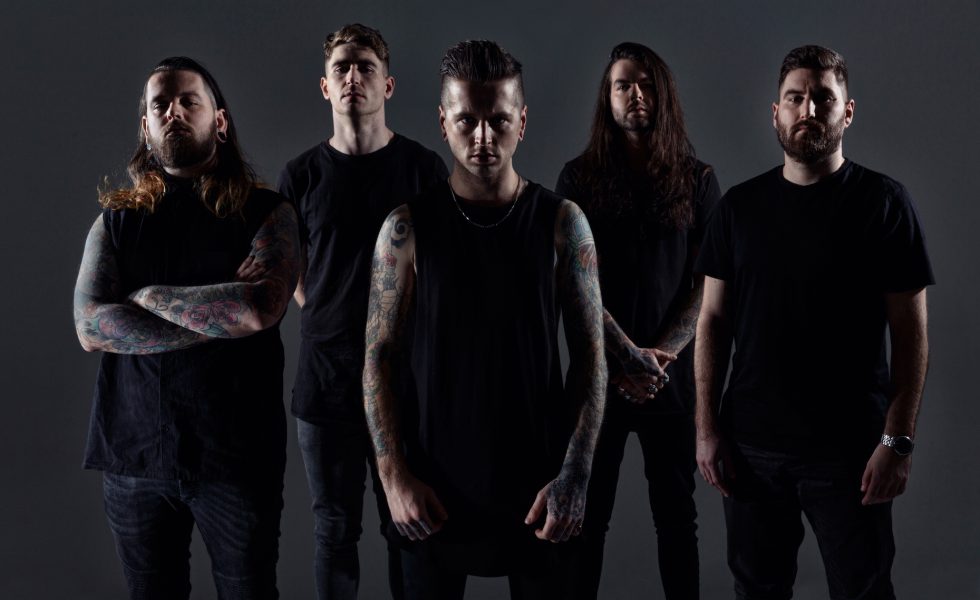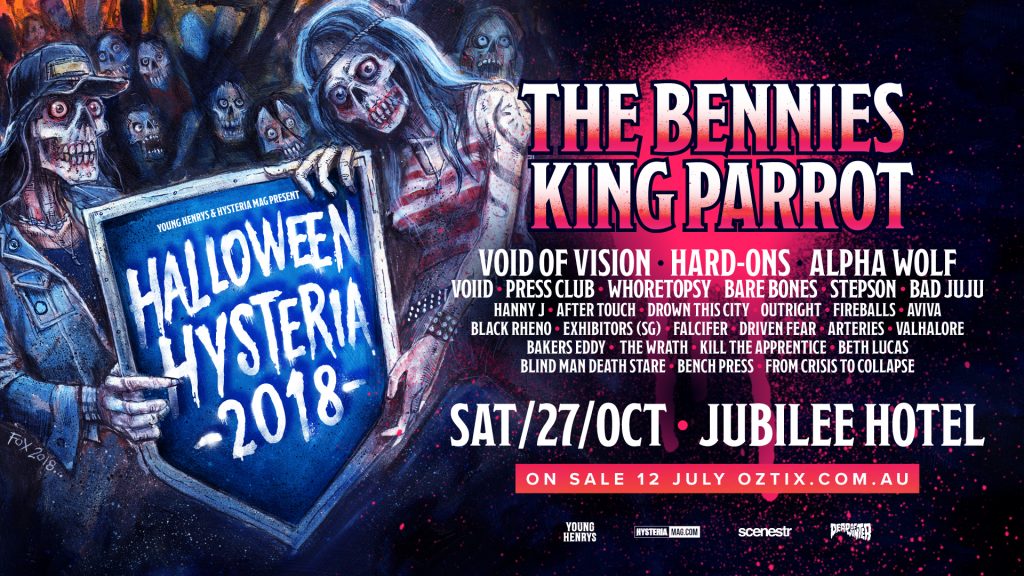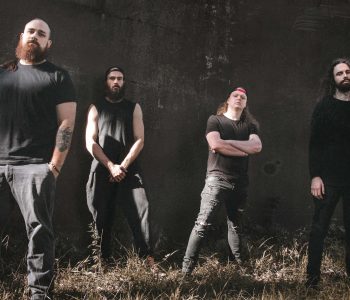A cloaked figure gazes upon a thousand-yard vista of turmoil, strife, and purgatory. In the …
Bury Tomorrow are in a position that many band’s would pay a career to achieve.
After over ten years of relentless touring, Bury Tomorrow have found themselves taking on the main stages of some of the biggest festivals in the world on the eve of dropping their consistent and strong new LP Black Flame.
MORE: HALLOWEEN HYSTERIA 2018: A Celebration Of All Things Loud // DEAD OF WINTER 2018: A Real Live Dead One // KICK OUT THE JAMS: POLARIS // Hailing Jams With Jamie Hails REVIEWS: IMMORTAL: Northern Chaos Gods // PAGAN: Black Wash
With the stages to expose them to more people than ever before, it seems like everything is clicking at the right time for the band. We took a few minutes with frontman Daniel Winter-Bates to discuss their thoughts on the new record, as well as the mission statement for the next album cycle.
HYSTERIA: Where are we catching you at the moment?
DANIEL: We’re in Berlin in Germany, which is were we are up to on our European run. We’re doing a mixture of festivals and headline shows.
The Euro festival circuit sounds like the ‘must do’ for metal band’s. When you mix that in with a headline run as well, is that just as rewarding, or more exhausting?
It’s a bit of both in all honesty. It’s hard to know where your at when your in the middle of it all, The adjustment between massive outdoor stages and smaller club shows means you have to keep it as intense as you can. You also have to think; “This is so rewarding to travel and play so many crazy places in a short period of time.” It’s such a staple point for any band in the touring year. No matter where you’re from, it’s the must do.
When you play the mainstage of Download or Resurrection Fest, what unexpected challenges do you come up against when you go onto ‘Centre Court’ so to speak?
We’ve gotten used to playing bigger stages, so as far as challenges, there aren’t so many because we just do our thing every show we play. However, the understanding of the responsibilities you have to make ensure everyone has a good time and stepping up to where we are being billed, that’s where you have to switch on and think “we have to bring this really hard.” You are so accountable to the promoter and fans at that point. Those bigger gigs are the ones that go the best. It’s shorter and you just smash it. Sometimes sound won’t go your way, but in most experiences, with those bigger gigs, the crowd gives you so much, so it’s always going to be so worth it regardless.
People are always gonna be into metal music; they just need to be able to have it presented to them the right way.
[ Daniel Winter-Bates ]
Having been apart of that European movement, what do you think goes into creating such a massive subculture over there?
I don’t know hey! They’ve always had such a great culture. Germany rules the roost with it. They push it so much—not dissimilar to Australia—they put it on main radio stations, they promote local bands; you can’t have a good scene unless you have bands from that genre in your own country that are huge. Case in point; Heaven Shall Burn sell thousands of tickets every night, and that really helps the scene because then locals get to open that stage in front of all those people coming to see them, and that becomes a viable goal for kids. It all works hand in hand. They’re really well run, there’s heaps of history involved … bands have been doing Europe for decades, so it’s so embedded historically, but they also put on new band’s across different genres all the time. The fans don’t care; they just enjoy heavy music!
Do you think it’s been just as receptive over there when you play non-metal festivals?
Being the heaviest band on the bill is always a better place to be because of the shock value that comes with it. We are really lucky because we straddle both the melodic side and the heavier side of music, so we are lucky because that means we can tailor our set depending where we are at. It also means that we can really rile up non-heavy festivals, that help people to remember us. People are always gonna be into metal music; they just need to be able to have it presented to them the right way. We are trying to engage with all fans, if you like the heavy stuff or not, and that makes a massive difference.
That engagement is so consistent for this band, and you’ve built up a rep for sticking to your strengths stylistically. What have you found some of the benefits of this have been, as opposed to pushing yourselves outside your natural genre limitations?
We know that we’ve been flying the metalcore flag for a long long time, and I think we are still perfecting that. So in that vein, we are changing because we want to get better at what we do. Our avenue though is keeping that core fan base close, and trying to gain new fans by slightly experimenting, but still attempting to connect. We know our sound. Our old songs aren’t a juxtaposition to the new catalogue; it’s a solid set. We’ve never wavered from our credibility, because we’re a metal band through and through you know?
You can see that with other bands like Iron Maiden and Amon Amarth who have maintained their core sound, but never sound old or recycled. That being said though, what are some of the riskiest moments on Black Flame that Bury Tomorrow took?
The song Overcast is a lot more swingy for us, because it’s in 3-4, and moves towards a ballad but in a much darker way. We’re very used to the standard drive and heaviness, so that was nerve-wracking for us to do. It came out so amazing, and really challenged us in a way that we’d never tried before.
There’s not many band’s that focus on the riff as much as we do—we try and bring that out with our singing vocals and not over-commercialise it, but I understand why band’s do that, because it’s where the genre has gone.
[ Daniel Winter-Bates ]
There’s a very nostalgic sound to these riffs, like your Killswitch Engage or Shadow’s Fall pioneers. It’s strange to talk about metalcore in such a “heritage” way though. Do you think that metalcore is becoming a sound from another time?
It’s evolved so much. Bands like Polaris, Parkway Drive & The Amity Affliction are all essentially melodic metal bands, but are also distinctly metalcore for the modern scene. There’s not many band’s that focus on the riff as much as we do—we try and bring that out with our singing vocals and not over-commercialise it, but I understand why band’s do that, because it’s where the genre has gone. We hold up band’s like Shadows Fall as our influence. You can’t listen to End Of Heartache and not think of it as a masterpiece. It’s madness. Other bands have never gotten close to beating that, so we are trying to think how we can make that genre more modern. So, it was a conscious decision, because we want to be a gateway for kids to go back and listen to those first acts that pioneered the genre.
Bury Tomorrow has been going for over a decade. What moment of the band’s career is being captured here on album #5?
I think for us, we’re ready to really make our point. We have the fans, we have the gigs, so we are ready to take over the circuit that we’ve been doing for so long. We really made it a conscious decision to make sure we took everything into account, given the feedback we’ve received in the past. We want to be able to headline festivals and arenas one day, so we hope that this is our chance to do that. We want it to be a turning point, and going forward we can look back and go “When we released Black Flame, that was the moment that it all clicked.”






